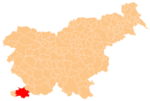Francesco Trevisani
This article includes a list of general references, but it lacks sufficient corresponding inline citations. (February 2013) |


Francesco Trevisani (April 9, 1656 – July 30, 1746) was an Italian painter, active in the period called either early Rococo or late Baroque (barochetto).
Life
[edit]Born in Capodistria, Istria (modern Koper now in Slovenia, then part of the Republic of Venice), he was the son of Antonio Trevisani, an architect, by whom he was instructed in the first rudiments of design. He then studied in Venice under Antonio Zanchi. He moved to Rome, where he remained until his death, in 1746. His brother, Angelo Trevisani remained a prominent painter in Venice.

In Rome, he was supported by Cardinal Pietro Ottoboni. He was strongly influenced by Carlo Maratta, as is manifest in his masterpiece, the frescoes in San Silvestro in Capite (1695–1696). In this commission, he worked alongside Giuseppe Bartolomeo Chiari and Ludovico Gimignani. In Rome, he was favoured with the patronage of Cardinal Chigi. Chigi employed him in several considerable works, and recommended him to the protection of Pope Clement XI, who not only commissioned him to paint one of the prophets in San Giovanni Laterano, but engaged him to decorate the cupola of the cathedral in Urbino. There he represented, in fresco, allegories of the four Quarters of the World, in which he displayed much invention and ingenuity. He was employed by the Duke of Modena, in copying the works of Correggio and Parmigianino, and also painted in Brunswick, Madrid, Munich, Stockholm, and Vienna.
He also shows Maratta's influence in the cartoons for the baptismal chapel in St. Peter's Basilica, in the oval with Prophet Baruch in San Giovanni in Laterano, and in the Death of St. Joseph in Sant'Ignazio. Trevisani painted scenes from the Life of the Blessed Lucy of Narni in the church of Narni (1714–15).
He also painted the huge canvas for the main altar of the Basilica of the Mafra National Palace in Portugal.
He became a member of the Academy of Arcadia in 1712. Among his pupils were Francesco Civalli of Perugia, Cav. Lodovico Mazzanti, and Giovanni Batista Bruglii.
Trevisani died in Rome in 1746.
Works
[edit]- Martyrdom of St Andrew, Sant'Andrea delle Fratte, Rome
- Stigmata of St Francis, Santissime Stimmate di San Francesco, Rome
- Frescos at Santa Chiara (St. Clare) chapel, San Silvestro in Capite, Rome
- Prophet Baruch, San Giovanni in Laterano, Rome
- Altar of the Ecstasy of Saint Francis at the Santissime Stimmate di San Francesco (Holy Stigmata of St. Francis)
- Suicide of Lucretia (between 1680 and 1740)
- Banquet of Cleopatra and Mark Anthony (1702), Palazzo Spada, Rome
- Portrait of Cardinal Pietro Ottoboni, Bowes Museum, Durham, England
- The Raising of Lazarus
- Saint Mark
- Saint Matthew
- Madonna and Child
- Peter Baptizing the Centurion Cornelius (1709)
- Death of Alexander the Great, Musée des beaux-arts de Pau, France
- Maria Clementina (1719)
- Apelles Painting Campaspe (1720)
- Apollo and Daphne (mid-18th century)
- Diana and Endymion
- Latona and the Frogs
- Penitent Magdalene (1725) Prado Museum, Madrid.[1]
- Madonna with Child (1708-1710) Prado Museum. Madrid.[2]
- Madonna with sleeping Child (att) Real Academia de Bellas Artes de San Fernando, Madrid.[3]
- Works at Palazzo Corsini, Rome:
- Martyrdom of St Lawrence
- Martyrdom of St Lucia
- Mary Magdalene
In January 2021 an episode of the BBC Four series Britain's Lost Masterpieces, centred on the fine art collection of the Royal Pavilion in Brighton, uncovered a work of Trevisani, a portrayal of Mary Magdalene, previously attributed to an unknown artist.[4][5]
Etchings and Drawings
[edit]- Andrea Adami da Bolsa
References
[edit]- ^ "Penitent Magdalen - The Collection - Museo Nacional del Prado". www.museodelprado.es. Retrieved 26 January 2021.
- ^ "The Virgin and Child - The Collection - Museo Nacional del Prado". www.museodelprado.es. Retrieved 26 January 2021.
- ^ "Red Digital de Colecciones de Museos de España - Museos". ceres.mcu.es (in Spanish). Retrieved 26 January 2021.
- ^ "Britain's Lost Masterpieces - Series 5: 1. Brighton" – via www.bbc.co.uk.
- ^ "Mary Magdalene | Art UK".
- Di Federico, F.R. (1977). Francesco Trevisani: Eighteenth-Century Painter in Rome. Washington DC.
{{cite book}}: CS1 maint: location missing publisher (link) - Review of Francesco Trevisani: Eighteenth-Century Painter in Rome. Francis H. Dowley. The Art Bulletin (1979) pp. 146–151.
- Bryan, Michael (1889). Walter Armstrong; Robert Edmund Graves (eds.). Dictionary of Painters and Engravers, Biographical and Critical. Vol. II L-Z. London: George Bell and Sons. p. 585.
See also
[edit]External links
[edit] Media related to Francesco Trevisani at Wikimedia Commons
Media related to Francesco Trevisani at Wikimedia Commons


 French
French Deutsch
Deutsch
